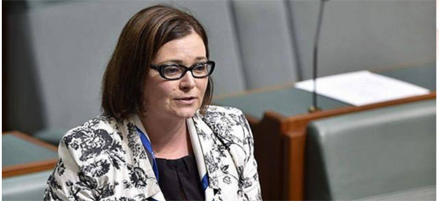
Lisa Chesters
The federal Labor Party has promised a forestry plan that emphasises science over environmental hysteria, and includes carbon farming and bioenergy as chief ways for the sector to fight climate change. Philip Hopkins for Timberbiz
“Labor’s principle – it has to be informed by the facts and by the science, not by panic or a social media campaign, not by a campaign waged online by GetUp! Be informed by the facts, get the experts in, get industry in and let’s work together,” said Lisa Chesters, the shadow Assistant Minister for Rural & Regional Australia.
“When it comes to endangered species and protecting flora and fauna, we’ve got to be sensible and rational about this.”
Ms Chesters, the member for Bendigo, was addressing the National Timber Councils Association conference in place of Shadow Agriculture Minister, Joel Fitzgibbon. The conference, which took place in Melbourne last week, was organised by former Latrobe City councillor Sandy Kam.
Ms Chesters said Labor wanted a plan that will address timber supply constraints and restore investment certainty. This was not just about industry jobs but reaching our goals in terms of climate and carbon.
“Forestry has such an important role to play in our future clean, green economy. The opportunity in relation to energy has always been a question about bioenergy and the role your industry can play on that,” she said.
“We know the UN convention on climate change identified bioenergy as renewable, but in this country we have completely dropped the ball. It could be because climate change has become a political hot potato, it has been caught up in that.
“We need to move past the politics and identify the opportunity that bioenergy plays in the climate change debate. This is where carbon farming is important. It’s good for farmers who engage in it – allows them to diversity their industry and share their risk.”
Ms Chesters said Labor would review the forestry water rule restrictions.
“The aim is to remove existing rules on plantations, farm forestry and carbon farming initiatives to ensure the sector can compete on a level playing field and play a bigger role in a low carbon future,” she said.
“There is a problem with these water restrictions and we will seek to resolve them, so you do have the water required for plantations and carbon farming.”
Ms Chesters said forestry had a role in tackling society’s carbon footprint.
“Building homes these days, there is a shortage of plantation timber for housing – more is going to steel,” she said. “If you really want to lower the carbon footprint and improve the environment, timber wins every time.”
Ms Chester said timber was still in vogue and was ethical. The timber in the home was from Australia, not Indonesia or Brazil.
“It’s a great opportunity to show how ethical your industry is with world’s best in environmental management,” she said.
Labor was also committed to a truly general national policy plan involving the stakeholders, including the Council of Australian Governments (COAG), Greens and conservatives.
“Labor acknowledges there will be radicals on the far right and left. Neither of us are like that; we are in the middle. We need to act constructively in policy,“ she said.
“We also acknowledge a positive shift in the conservationist movement; they are talking about bio-links in a positive way. Some admit they got it wrong by locking up the forests and keeping everybody out.
“For biodiversity and sustainability reasons, we do need to look at healthy forest management, look at thinning in some ways. Because they have been locked up and have not had the right management plans in place.”
Ms Chesters said other key features of Labor’s forestry plan were:
- Improving research and development. The industry is good at innovation.
- Provide every opportunity to climb the value-added area. Too much product in this country is just bulk exported.
- Procurement rules, local content – the role we can play as a federal government buyer.
- Maximising where Australian forestry has a competitive advantage.
- Investment in TAFE, with no up-front fees for forestry courses to alleviate skills shortages and get young people interested in the industry.
Ms Chesters said political leaders had been missing in the debate.
“There are politicians in Canberra on both sides who want to get rid of the rhetoric and focus on real change,” she said. “We do need to look beyond the rhetoric and party politics.
The caveat – it has to be good policy. We do reserve our right to speak out against bad policy.”





